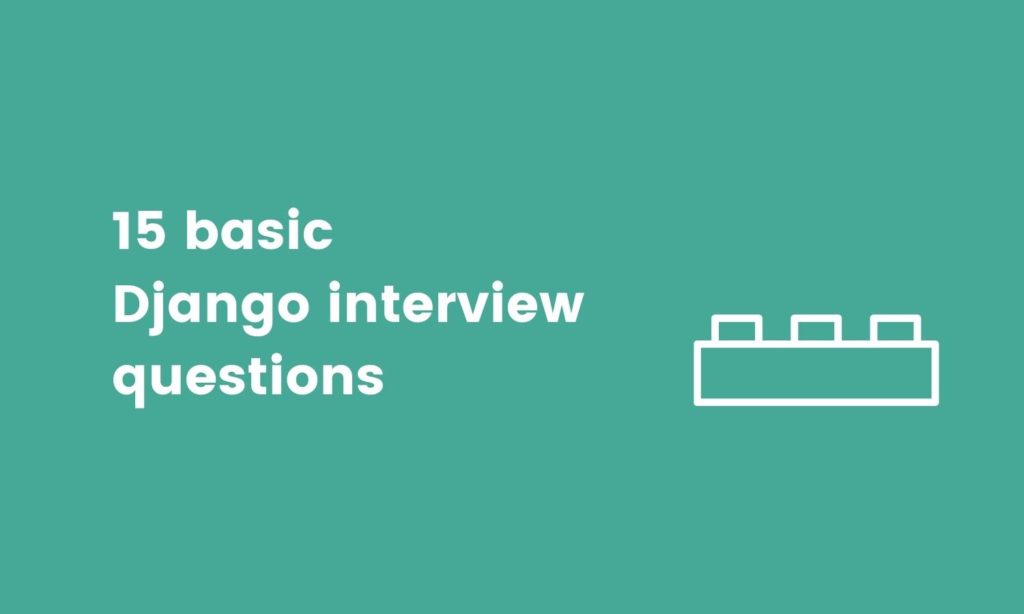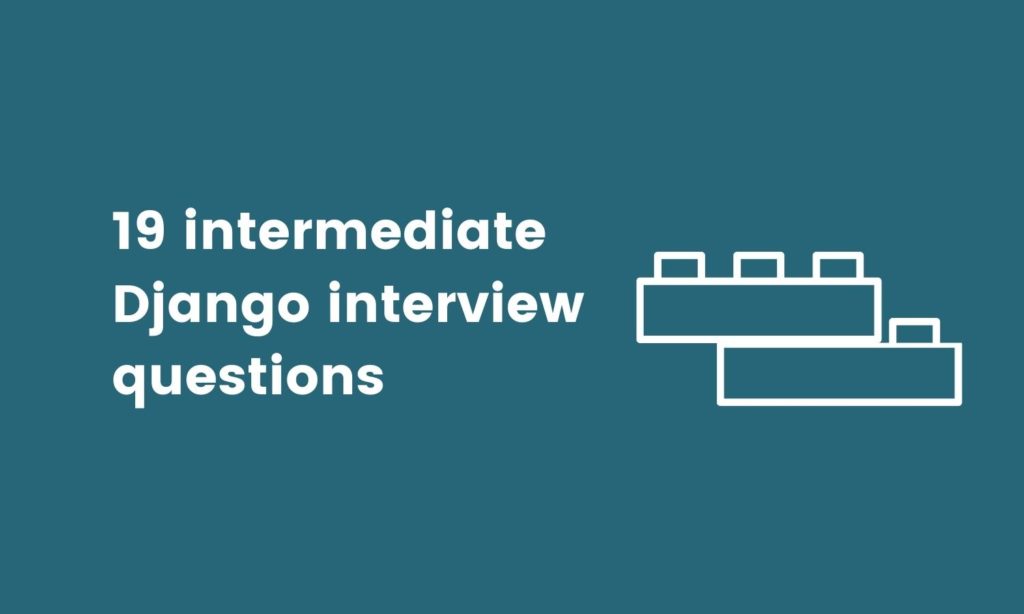52 Django interview questions to hire your next engineer
Since software engineers need in-depth technical knowledge to use the Django framework, in addition to exceptional Django skills to facilitate their performance on the job, you need to assess your candidates’ proficiency in this area.
Have you got the right interview questions lined up? If you answered no, this article will assist you.
Here are the top 52 Django interview questions to ask your candidates during the interview stage.
Table of contents
- 15 basic Django interview questions
- 5 vital basic Django interview questions and the content the best answers will contain
- 19 intermediate Django interview questions
- 5 vital intermediate Django interview questions and the content the best answers will contain
- 18 advanced Django interview questions
- 5 vital advanced Django interview questions and the content the best answers will contain
- When during your hiring process should you use Django interview questions?
- For which roles should you use Django interview questions?
- Take your pick and finalize your Django interview questions
15 basic Django interview questions
The initial 15 interview questions cover basic Django concepts and are best suited for junior software engineer jobs.
What do you know or understand about Django?
What do you understand the term CRUD to mean?
What is your understanding of the term CSRF?
Could you explain a couple of the advantageous features of Django?
Explain which features of Django might be considered drawbacks.
Do you understand what is meant by Django architecture?
Do you understand how the project directory is structured in Django?
Could you explain what is meant by models?
State what is meant by template language.
State what is meant by views in Django.
State your understanding of ORM.
Could you outline what static files are used for and why they are critical?
State your understanding of DRF. Could you name one advantage of DRF?
Could you explain what is meant by a Django URL?
Could you briefly outline the inheritance styles found in Django?
5 vital basic Django interview questions and the content the best answers will contain
Of the list above, here are five of the most vital basic Django interview questions you should ask candidates and the answers you should expect top candidates to give.
1. What do you know or understand about Django?
Answers to this question should mention that the open-source Django framework is used for web applications. Candidates should understand that Django facilitates web application development and recognize that many professional software engineers use this framework because it produces secure sites that are simple to maintain.
2. What do you understand the term CRUD to mean?
CRUD helps software engineers to remember the ideal way to build models for application programming interfaces. It stands for create, read, update, delete.
3. State your understanding of DRF. Could you name one advantage of DRF?
DRF refers directly to the Django REST framework. The framework facilitates the process of building an API that is RESTful. One advantage of the Django REST framework is that it doesn’t use much bandwidth when software engineers build RESTful APIs.
4. Could you explain a couple of the advantageous features of Django?
Your software engineers should know what makes Django a useful framework. Your best candidates might mention some advantageous features of Django, such as:
The option to split HTML from business logic
The option to split the modules of code into groups
The option to choose from exceptional libraries
5. Explain which features of Django might be considered drawbacks.
Likewise, knowing Django’s limitations is crucial. Your candidates might outline the fact that it is monolithic in size and, therefore, an inappropriate option for projects on the small side. They might also mention that conventions are lacking and that software engineers, therefore, have to define things exactly.
The best insights on HR and recruitment, delivered to your inbox.
Biweekly updates. No spam. Unsubscribe any time.
19 intermediate Django interview questions
Here, we have the best intermediate-level Django interview questions that you can ask candidates to learn about their level of understanding.
In what circumstances would you use the ‘migrate’ command?
Explain the particular situations or reasons you must make use of ‘makemigrations’.
Can you outline and briefly explain what session frameworks do?
Are you familiar with ‘Django-admin’? What do you understand about this?
How would you differentiate between projects and apps in Django?
How would you describe Django’s stability?
Are you familiar with serialization?
What do you understand about requests in Django?
Can you briefly outline and define what signals are in Django?
Can you briefly outline a couple of caching approaches for Django?
What is your understanding of user authentication?
What is your approach to configuring static files?
Could you briefly outline what is meant by the response lifecycle?
Are you aware of the command line that is used for loading data in Django? Could you explain a little about it?
Are you aware of what the map function does in Python? Could you explain this function?
Why are NumPy arrays better than Python lists that are nested?
What do you understand about decorators? Could you explain what they do?
Are you aware of how NumPy and SciPy are dissimilar? Could you name a couple of differences?
Can you describe or outline the request/response cycle?
5 vital intermediate Django interview questions and the content the best answers will contain
Now, let’s look at the five vital intermediate Django interview questions and the ideal answers you should receive from mid-level software engineers.
1. How would you describe Django’s stability?
When engineers code, the code they develop should continue to work with future releases, and candidates should be aware of this. They should also know that Django is ideal in this regard because of its stability and that engineers will benefit from its compatibility for future releases.
2. Are you familiar with serialization?
Answers to this question will demonstrate your candidates’ technical knowledge and Django skills. They must be aware that serialization enables engineers to take the model data and switch it to a wide variety of data formats. Some of these data formats might include JSON or XML.
3. Can you briefly outline a couple of caching approaches for Django?
Because sites with high amounts of traffic will benefit from caching, which ensures they won’t need to be loaded from your server again every time in the future, engineers should recognize which approaches can be used for caching in Django. Some approaches they might mention include:
In-memory
Database
File system
Memcached
4. What is your approach to configuring static files?
Top candidates should be well versed in configuring static files in Django. The best answers will outline the four required steps that enable software engineers to achieve this, which include:
Making certain that they have added Django.contrib.staticfiles to INSTALLED_APPS
Establishing the definition in STATIC_URL
Once they have configured STATICFILES_STORAGE, going to the Django templates and using the tag to establish the appropriate URL for the path that is given
Adding and storing the static files
5. Are you aware of how NumPy and SciPy are dissimilar? Could you name a couple of differences?
Software engineers should outline the meaning of NumPy and SciPy — which stand for Numerical Python and Scientific Python, respectively. They should then be able to mention that software engineers use NumPy for homogeneous array options, whereas SciPy is an open-source Python library and helps to resolve problems of a mathematical or scientific nature.
18 advanced Django interview questions
This last list of Django interview questions is suited to senior-level software engineer positions. Choose from the list and adapt the questions to your organization.
Are you aware of the many databases that Django supports? Name six.
Are you aware of what session frameworks are? Could you describe what they do?
Can you briefly explain what middleware is used for?
Could you briefly explain what context means?
Outline and describe the following function: Django.shortcuts.render.
Outline and describe why settings.py is critical.
Which approach would you use to view every item in the model?
Can you explain how file-based sessions are used?
Can you briefly outline and describe a little about mixin?
Could you briefly outline and describe what Django field class means?
What are the drawbacks of permanent redirection?
How are ForeignKeyField and Django OneToOneField dissimilar?
Which method would you use to obtain one specific item in the model?
Could you briefly describe how you would customize the admin interface functionality?
Name a couple of ways that a project could be enhanced or maintained in Django.
Which comparisons would you make between Django and Node.js? Which is better?
In what ways would you say Django differs from Flask?
Explain to us your method when establishing or setting up databases in Django.
5 vital advanced Django interview questions and the content the best answers will contain
Here are five of the most critical advanced Django interview questions and the answers you might receive from the best senior-level software engineers.
1. Are you aware of the many databases that Django supports? Name six.
Six of the many databases that Django supports include:
MySQL
Oracle
PostgreSQL
Microsoft SQL Server
Firebird
IBM Db2
Advanced-level or senior-level engineers might also go on to mention the fact that NoSQL databases are not supported by Django.
2. Can you briefly explain what middleware is used for?
Middleware can be thought of as a link between the requests and responses made in Django. Candidates might also mention that middleware helps to filter out invalid or potentially malicious requests.
Middleware isn’t just restricted to this one use, though. For instance, software engineers can use them to add further data to a request, which the application will use — one such example of this is the authentication middleware.
3. Name a couple of ways that a project could be enhanced or maintained in Django.
Software engineers who carry out projects in Django must be aware of the best practices that can enhance a project. Some of these best practices include:
Ensuring the code matches the guide that outlines the best practices in Django
Making use of the debugging toolbar in Django
Making sure to document the API
4. What are the drawbacks of permanent redirection?
Since the use of permanent redirection is normally only ideal for ensuring that traffic doesn’t reach an old uniform resource locator (URL), it is best to use this in these circumstances only. Candidates might also mention that it can be quite hard to get rid of permanent redirects and that browser caching can cause problems if a software engineer attempts to redirect to other places.
5. In what ways would you say Django differs from Flask?
One of the main differences your candidates might outline when comparing Django with Flask is that although Django is ideal for large projects, Flask is more suited to projects that are smaller. They may also state that Django’s in-depth administration panel is useful and that Flask doesn’t provide such a feature. Furthermore, while Flask doesn’t offer visual debugging support, Django does.
When during your hiring process should you use Django interview questions?
When hiring a Django developer, we recommend using these interview questions after you’ve received the results of your candidates’ skills assessments. Since skills assessments can save you plenty of time prior to the interview, particularly if you use them at the start of the hiring process, you should give candidates skills assessments first and then follow up with an interview.
For which roles should you use Django interview questions?
Django interview questions are ideal for open software developer or software engineer positions. They might also be ideal for an engineering manager position if you know that the successful candidate might be coding from time to time.
Always remember that you must match the seniority level of your open position to the Django interview questions you choose. For instance, if you’re hiring for a senior software engineer, try to stick to intermediate and advanced Django interview questions.
Take your pick and finalize your Django interview questions
Selecting your Django interview questions carefully is important. Always select questions that are aligned with the level of the role you’re hiring for.
It’s also a good idea to try and avoid using questions that you’ve directly copied from other organizations; ensure they are suited to your organization to deliver a first-rate candidate experience.
And make sure that you attract top talent with a compelling Django developer job description and prioritize skills testing. Do this at the beginning to reap the benefits of a more efficient hiring process. The best way to get started with skills testing is to try TestGorilla for free.
You've scrolled this far
Why not try TestGorilla for free, and see what happens when you put skills first.





















